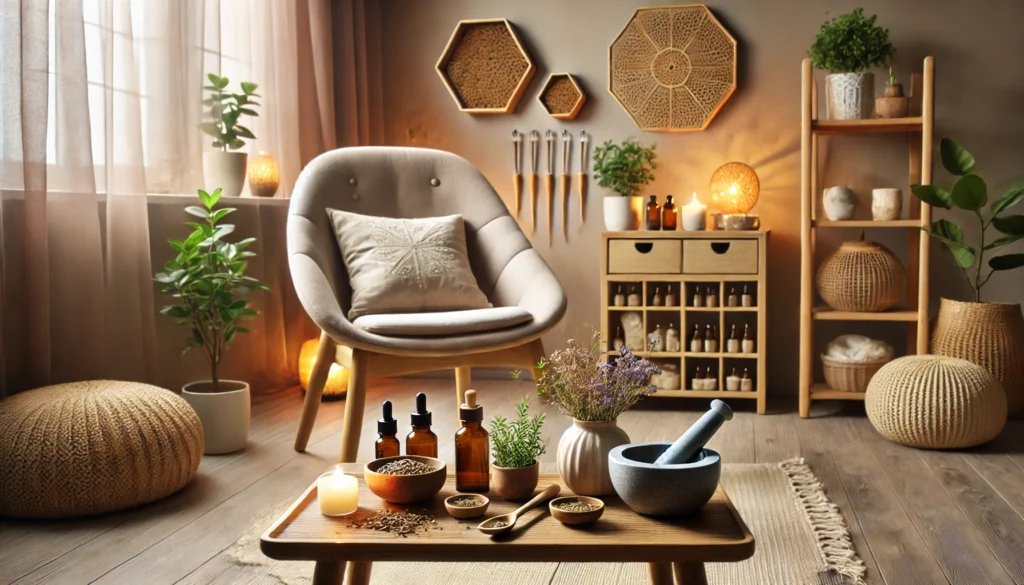Navigating the tumultuous waters of anxiety can be a daunting journey. While conventional medicine offers various treatments, many individuals seek alternative therapies for anxiety that align more closely with holistic health philosophies. In this article, we delve into the world of alternative medicine for anxiety and panic attacks, examining mindfulness practices, natural remedies, and innovative stress reduction strategies.
You may also like: Natural Supplements for Effective Anxiety Relief

Understanding Anxiety: A Brief Overview
Anxiety disorders are among the most prevalent mental health issues worldwide, affecting millions of individuals. Symptoms can range from mild unease to debilitating panic attacks, impacting daily life and overall well-being. Traditional treatments include medication and therapy, but these are not always effective for everyone, leading many to explore alternative medicine for anxiety.
The Prevalence of Anxiety Disorders
Anxiety disorders are alarmingly common, affecting approximately 18% of adults in the United States alone. These disorders manifest in various forms, including generalized anxiety disorder, social anxiety disorder, and panic disorder. Despite the availability of conventional treatments, many individuals continue to experience significant symptoms, prompting a search for alternative solutions that might offer better efficacy or fewer side effects.
Symptoms and Impact
The spectrum of anxiety symptoms is broad, with some individuals experiencing persistent worry and fear, while others endure physical symptoms such as heart palpitations and dizziness. The impact on daily life can be profound, interfering with work, relationships, and overall quality of life. This disruption often leads sufferers to explore different avenues for relief, including alternative therapies that promise holistic healing.
Limitations of Conventional Treatments
Conventional treatments for anxiety, such as cognitive-behavioral therapy (CBT) and medications like selective serotonin reuptake inhibitors (SSRIs), are effective for many but not all. Some individuals may experience side effects from medications or find therapy alone insufficient. These limitations highlight the need for complementary approaches that can address anxiety from multiple angles, integrating both mind and body.
The Role of Mindfulness in Anxiety Management
Mindfulness, a practice rooted in ancient Eastern traditions, has gained significant traction in Western medicine as a powerful tool for anxiety management. At its core, mindfulness involves focusing on the present moment without judgment. This practice can help individuals break the cycle of anxiety by reducing rumination and promoting a state of calm awareness.
Mindfulness Techniques for Anxiety
- Mindful Breathing: Simple yet effective, mindful breathing involves paying attention to the breath, noting each inhale and exhale. This can anchor the mind and provide immediate relief from anxiety symptoms. By concentrating on the breath, individuals can create a mental space that reduces stress and enhances focus, allowing a temporary escape from anxious thoughts.
- Body Scan Meditation: This practice involves mentally scanning the body for areas of tension and consciously relaxing those areas, promoting physical and mental relaxation. The body scan is often used to increase awareness of physical sensations, helping individuals recognize and release stress stored in different body parts, thus fostering a holistic sense of relaxation.
- Mindful Walking: Engaging in walking meditation encourages awareness of each step and the sensations experienced during movement, fostering a sense of grounding and presence. This practice is particularly beneficial for those who find sitting meditation challenging, offering an alternative way to cultivate mindfulness in everyday activities.
Research Supporting Mindfulness
The growing body of research supporting mindfulness for anxiety underscores its potential as a viable alternative therapy. Studies have shown that regular mindfulness practice can lead to significant reductions in anxiety symptoms and improve overall emotional regulation. For instance, mindfulness-based stress reduction (MBSR) programs have demonstrated effectiveness in decreasing anxiety and improving coping mechanisms, suggesting that mindfulness can be a cornerstone in anxiety management.
Mindfulness in Daily Life
Integrating mindfulness into daily routines can transform how individuals experience anxiety. Simple practices like mindful eating, where one focuses on the taste, texture, and aroma of food, can enhance the enjoyment of meals and reduce stress. Mindfulness can also be applied in work settings through short, mindful breaks, promoting productivity and reducing workplace anxiety.
Alternative Therapies for Anxiety: Beyond Mindfulness
While mindfulness is a cornerstone of alternative anxiety management techniques, several other therapies offer promising benefits.
Herbal Remedies and Supplements
Many individuals turn to natural anxiety remedies, such as herbal supplements, to alleviate symptoms. Some popular options include:
- Valerian Root: Known for its sedative properties, valerian root is often used to promote relaxation and improve sleep quality. This herb has been used for centuries, and its calming effects make it a popular choice for those seeking natural sleep aids.
- Kava Kava: This South Pacific plant has been traditionally used for its calming effects and is believed to reduce anxiety without impairing cognitive function. Kava Kava’s active compounds, kavalactones, have been studied for their potential to ease anxiety, though users should be aware of possible interactions with other medications.
- Passionflower: This herb is thought to increase levels of gamma-aminobutyric acid (GABA) in the brain, which can help reduce anxiety. Passionflower’s calming effects are well-documented, making it a favored supplement for those looking to manage stress naturally.
Acupuncture
Acupuncture, a practice rooted in Traditional Chinese Medicine, involves inserting thin needles into specific points on the body to balance the flow of energy or “qi.” Research suggests that acupuncture can be effective in reducing anxiety by regulating the nervous system and promoting a sense of calm. This ancient practice is believed to release endorphins and increase blood flow, contributing to its therapeutic effects.
Aromatherapy
The use of essential oils for therapeutic purposes, known as aromatherapy, can also aid in anxiety management. Oils like lavender, chamomile, and bergamot are renowned for their calming properties. Inhaling these oils or using them in massage can help reduce stress and anxiety symptoms. Aromatherapy can be easily incorporated into daily routines, from diffusing oils in the home to using scented lotions, offering a sensory approach to stress relief.
Art and Music Therapy
Creative therapies such as art and music therapy have emerged as valuable tools for managing anxiety. Art therapy encourages self-expression through various mediums, helping individuals process emotions and reduce stress. Music therapy, on the other hand, uses rhythm and melody to influence mood and promote relaxation. Both therapies offer alternative ways to explore and express feelings, providing an outlet for anxiety that transcends traditional talking therapies.

Stress Reduction Strategies: A Holistic Approach
In addition to specific therapies, adopting a holistic lifestyle approach can significantly impact anxiety levels. Here are some stress reduction strategies to consider:
Exercise
Regular physical activity is a proven stress-buster. Exercise releases endorphins, which are natural mood lifters. Whether it’s yoga, running, or weightlifting, incorporating regular exercise into your routine can enhance mental well-being. Exercise not only improves physical health but also provides a structured outlet for stress, helping to clear the mind and boost self-esteem.
Nutrition
A balanced diet can play a crucial role in managing anxiety. Nutrients such as omega-3 fatty acids, magnesium, and B vitamins are essential for brain health and emotional regulation. Reducing caffeine and sugar intake can also help stabilize mood and reduce anxiety symptoms. A focus on whole foods and regular meal patterns can prevent blood sugar fluctuations, which are often linked to mood swings and anxiety.
Sleep Hygiene
Quality sleep is vital for mental health. Establishing a regular sleep schedule, creating a restful environment, and avoiding screens before bedtime can improve sleep quality and reduce anxiety. Sleep hygiene involves not only the duration but also the quality of sleep, emphasizing the importance of a calm nighttime routine and a comfortable sleep setting to foster restorative rest.
Social Connections
Building and maintaining strong social connections can be a powerful antidote to anxiety. Engaging with supportive friends and family can provide emotional support and reduce feelings of isolation. Social activities, whether in-person or virtual, can enhance mood and offer a sense of belonging, reinforcing the individual’s support network.
Time Management
Effective time management can alleviate anxiety by reducing the stress associated with deadlines and overwhelming tasks. Prioritizing tasks, setting realistic goals, and allowing time for breaks can prevent burnout and enhance productivity. By organizing time efficiently, individuals can create a balanced schedule that accommodates work, leisure, and self-care.
The Future of Alternative Medicine for Anxiety
As interest in alternative medicine grows, so does the research supporting its efficacy. Future implications include more integrative approaches that combine traditional and alternative therapies, offering comprehensive treatment plans tailored to individual needs.
Integrative Health Care Models
The future of anxiety treatment may lie in integrative health care models that seamlessly blend conventional and alternative therapies. Such models focus on treating the whole person—mind, body, and spirit—rather than just the symptoms. By incorporating diverse therapeutic strategies, practitioners can offer personalized treatment plans that address the unique needs of each patient.
Technological Advancements
Advancements in technology are likely to influence the development of alternative therapies for anxiety. Virtual reality (VR) therapy, for example, is an emerging tool that offers immersive environments for relaxation and exposure therapy. Similarly, mobile applications that provide guided meditation or cognitive-behavioral techniques offer accessible options for anxiety management, allowing individuals to practice self-care on the go.
Ongoing Research and Education
Continued research into the efficacy of alternative therapies will be crucial for their integration into mainstream medicine. Educational initiatives aimed at both healthcare providers and patients can promote awareness and understanding of these therapies, leading to more informed choices. As knowledge expands, the stigma surrounding alternative medicine may decrease, paving the way for broader acceptance and utilization.

Conclusion
Alternative medicine for anxiety offers a myriad of options for those seeking holistic approaches to mental well-being. From mindfulness to herbal remedies and lifestyle changes, these therapies provide valuable tools for managing anxiety. As we continue to understand more about the mind-body connection, the integration of alternative and conventional medicine may pave the way for more effective anxiety treatment in the future.
Through thoughtful consideration and professional guidance, individuals can find a personalized path to tranquility and resilience in the face of anxiety. By embracing a comprehensive approach that includes both traditional and alternative methods, the journey towards mental well-being becomes a holistic experience, offering hope and healing for those navigating the complexities of anxiety.
Further Reading:
Treating anxiety without medication
Natural Remedies to Alleviate Anxiety
How to treat anxiety naturally
Important Note: The information contained in this article is for general informational purposes only, and should not be construed as health or medical advice, nor is it intended to diagnose, prevent, treat, or cure any disease or health condition. Before embarking on any diet, fitness regimen, or program of nutritional supplementation, it is advisable to consult your healthcare professional in order to determine its safety and probable efficacy in terms of your individual state of health.
Regarding Nutritional Supplements Or Other Non-Prescription Health Products: If any nutritional supplements or other non-prescription health products are mentioned in the foregoing article, any claims or statements made about them have not been evaluated by the U.S. Food and Drug Administration, and such nutritional supplements or other health products are not intended to diagnose, treat, cure, or prevent any disease.


